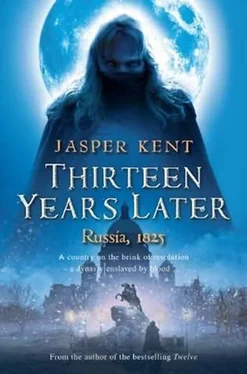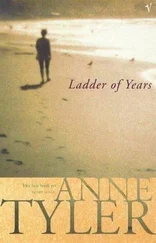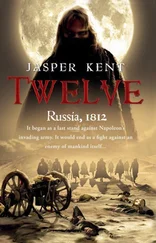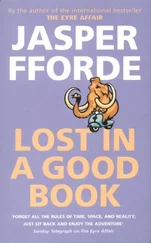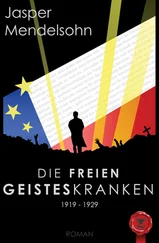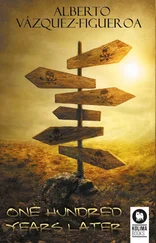It was Aleksei who asked the all-important question, though he had already heard rumours as to the answer.
‘When?’
The room quietened. All eyes turned to Ryleev.
‘It’s too late for this year,’ he said. ‘In the next few days, the tsar will be leaving for Taganrog.’
‘Why’s he going there?’ asked Kakhovsky.
‘We don’t know,’ admitted Ryleev. ‘He claims it is for the tsaritsa’s health, but I find that hard to credit. There are some secrets that even our most well-placed sympathizers are not privy to. But he’ll be close to the Crimea and the Black Sea. My guess is he wants to strike a deal with the Turks.’
‘Not standing by the Greeks, then?’ said Kakhovsky. ‘They’re Christians at least.’
‘They’re revolutionaries,’ explained Ryleev. ‘If he helped them to throw off the Ottomans – well, what example would that set?’
‘One more reason to get rid of him quickly.’
Ryleev nodded. ‘It will happen,’ he said. ‘And it will happen next year. We may be thirty-seven years behind the French, but no one will blame us for that. 1826 will go down in history as the year of the Russian Revolution.’
The meeting broke up early and Aleksei headed home. The sun was bright and warm, as befitted a city like Petersburg, and served only as a reminder of how unRussian a place it was. He walked home along the bank of the Yekaterininsky Canal, his path meandering with that of the waterway. He knew that his wife, Marfa Mihailovna, was expecting him not to be late and that the party which she had planned required his presence – if not his active participation – for its success, but even so, he did not walk too briskly. The reason for the party added a certain irony to the discussions that had just been taking place. Today was 30 August; the feast day of Saint Aleksandr Nevsky, and hence Tsar Aleksandr’s name day. Many houses in Petersburg would be holding similar soirées.
The meeting of the Northern Society, as it styled itself, had taken place at the home of Prince Obolensky, in the shadow of the golden domes of Saint Nikolai’s. Aleksei had been a member for a long time, almost from its foundation in 1816, when it had gone by the name of the Union of Salvation. Many of the members had come to the organization through Freemasonry, having been initiated into lodges in Paris, but Aleksei had little enough stomach for genuine Orthodox ritual, let alone the pseudo-religious twaddle that was practised in the lodges. It had not been a bar to him joining the Union. The name had changed many times since then, but the aspirations had not – they had merely become more focussed. Once, its political aims had been vague; progressive, certainly, but with the intention of having some influence on the reforms which, back then, Aleksandr was still believed to be planning. For many, Aleksei among them, philosophy and literature had been favoured over politics as matters of debate, and discussions of Brutus and Dante and the like had abounded. When the subject matter of the discussions had changed, many had left, but Aleksei had chosen to remain.
‘They’re the three greatest heroes of Christianity,’ said Maksim Sergeivich, his voice kept low.
He had said it a long, long time before, but Aleksei could place it precisely. They had both been lying on their stomachs on a hot, dry hillside a little to the west of Smolensk, in August of 1812, just days before the city would be abandoned to the French. Maks had died scarcely a month later. ‘Maks had died’ – expressing it that way made it all so simple. ‘Aleksei had left Maks to die’ was more accurate. ‘Aleksei had left Maks to be slaughtered’ was the phrase that best fitted the facts.
But in Smolensk, neither of them would have dreamed of the eventual manner of Maks’ death, nor of its proximity. They had been observing the French lines, Aleksei peering through his spyglass, looking for signs of the advance they knew would soon come. Somehow the conversation had turned to Brutus, Cassius and Judas, the three traitors who, in the ninth circle of Dante’s Hell, were each consumed throughout eternity by one of the three faces of a Satan himself encased up to his chest in ice. That any of these three could be a hero of Christianity was patently ridiculous, and yet Aleksei knew Maks would not have made the statement without there being a compelling argument behind it.
‘I don’t think many theologians would agree with you there,’ Aleksei had said, looking down and making a brief note of what he could see of the enemy’s deployments.
‘Really?’ said Maks. ‘Perhaps I’m wrong.’ Anyone who did not know him might have been convinced.
‘Go on then,’ said Aleksei. ‘Start with Judas.’
‘That’s the easy one.’ Maks turned on to his side, instinctively sliding a little way down the hillside to avoid any chance of being seen. ‘Without Judas, there would have been no arrest at Gethsemane. Without the arrest, no trial. Without the trial, no crucifixion. Without the crucifixion, no resurrection, and without the resurrection, no Christian religion.’
‘That doesn’t quite make him a hero. He didn’t act for good reasons.’
‘His reasons are debatable,’ Maks explained, characteristically pushing his spectacles up over the bridge of his nose. ‘The gospel of John even has it that Christ selected him as the betrayer, and that Satan only entered into him after that, which looks like collusion to me. And yet Christ sits up there at the right hand of God, and Judas ends up in Hell.’
Aleksei had heard this line from Maks more than once over the years since they’d first met; both recruited by Vadim Fyodorovich to a small band to carry out ‘special duties’. It was Vadim who had sent them out there, and was waiting back in Smolensk for their report, along with Dmitry Fetyukovich, the final member of the group.
‘So what about Brutus and Cassius?’ pressed Aleksei. ‘Weren’t they dead before Christ was even born?’
‘When I was a kid,’ replied Maks, though Aleksei questioned – would always question – whether he wasn’t still a kid, ‘I used to marvel at the coincidence that the establishment of the Roman Empire and the birth of Christ were separated by less than thirty years; the political foundation of the Western world and its religious foundation, at the same instant in historical terms. What an age to have been alive! But, of course, it was no coincidence. Rome conquered Europe and delivered both its politics and its religion. OK – Christianity was lucky to be one of the several Roman religions to gain ascendancy, but it wasn’t luck that got it spread across the empire. That was military might. And there wouldn’t have been a Roman Empire if Brutus and Cassius hadn’t tried to prevent there being one.’
‘So again, they’re heroes, but not by their own intent,’ said Aleksei.
‘Dupes, really. We know Christ’s plan was to die. Maybe Caesar decided it was best to go out on a high note and engineered things the way he wanted them. For both, death made them greater than they had been in life.’
‘For Christ, perhaps, but Caesar’s death was pretty final.’
‘Julius Caesar’s was, but Caesars have been doing well enough out of it ever since; and kaisers, and tsars.’
‘Maybe,’ said Aleksei, ‘although you can’t put the spread of Christianity down just to the Romans. Christianity goes beyond Europe, which they never did.’
‘Carried by the British Empire to the north of America and by the Spanish to the south. It’s still the same mechanism.’
‘And what about the Russians? The Roman Empire never got this far.’
But Maks never answered. He had crawled forward once more to examine the French camp, and had seen something which Aleksei had not. ‘My God,’ he said. ‘They’re moving.’
Читать дальше
